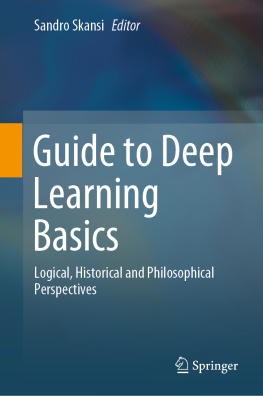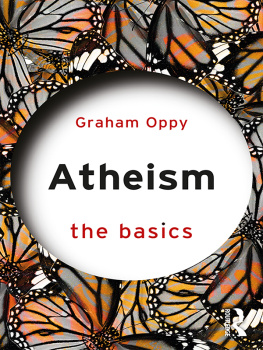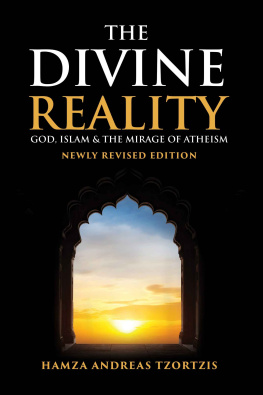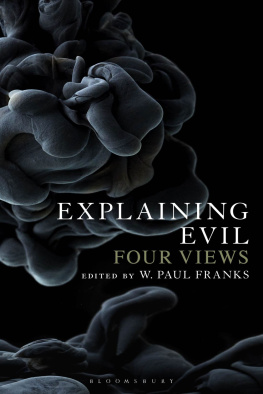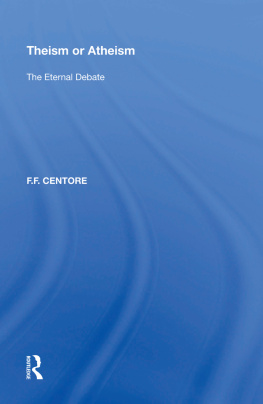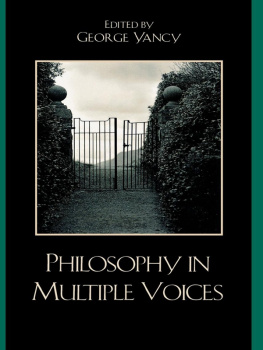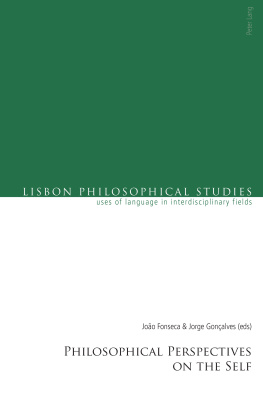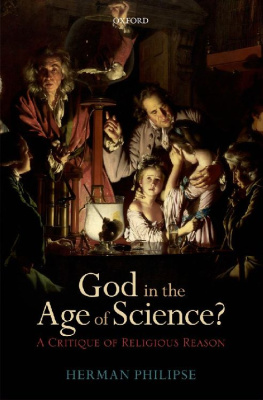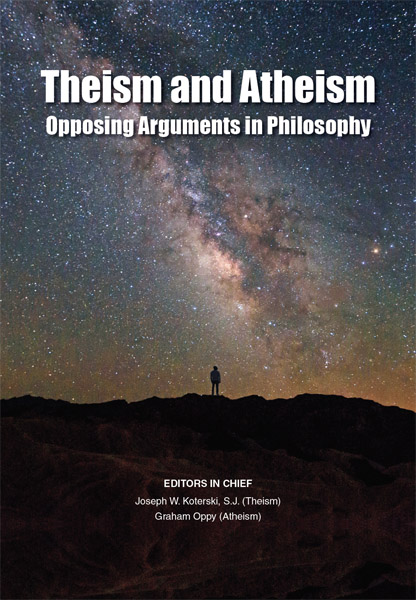Copyright Page

Theism and Atheism: Opposing Arguments in Philosophy
Joseph W. Koterski, S.J. and Graham Oppy, Editors
Project Editor: Jonathan Vereecke
Contributing Editor: Rebecca Parks
Product Design: Kristine Julien
Acquisitions Editor: Laurie Malashanko
2019 Macmillan Reference USA, a part of Gale, a Cengage Company.
ALL RIGHTS RESERVED. No part of this work covered by the copyright herein may be reproduced or distributed in any form or by any means, except as permitted by US copyright law, without the prior written permission of the copyright owner.
For product information and technology assistance, contact us at Gale Customer Support, 1-800-877-4253.
For permission to use material from this text or product, submit all requests online at www.cengage.com/permissions.
Further permissions questions can be emailed to permissionrequest@cengage.com
Cover photograph: Christopher Smith / EyeEm / Getty Images.
While every effort has been made to ensure the reliability of the information presented in this publication, Gale, a Cengage Company, does not guarantee the accuracy of the data contained herein. Gale accepts no payment for listing, and inclusion in the publication of any organization, agency, institution, publication, service, or individual does not imply endorsement of the editors or publisher. Errors brought to the attention of the publisher and verified to the satisfaction of the publisher will be corrected in future editions.
LIBRARY OF CONGRESS CATALOGING-IN-PUBLICATION DATA
Names: Koterski, Joseph W., editor.
Title: Theism and atheism : opposing arguments in philosophy/Joseph W. Koterski, S.J. and Graham Oppy, editors.
Description: Farmington Hills, Mich.: Macmillan Reference USA, a part of Gale, a Cengage Company, 2019. | Includes bibliographical references and index.
Identifiers: LCCN 2018041749| ISBN 9780028664453 (hardcover) | ISBN 9780028664460 (ebook)
Subjects: LCSH: Theism. | Atheism.
Classification: LCC BL200.T442019 | DDC 211/.3dc23 LC record available at https://lccn.loc.gov/2018041749
Gale, a Cengage Company
27500 Drake Rd.
Farmington Hills, MI 48331-3535
ISBN 978-0-02-866445-3 (this volume)
This title is also available as an e-book.
ISBN: 978-0-02-866446-0
Contact your Gale sales representative for ordering information.
Printed in Mexico
1 2 3 4 5 6 7 23 22 21 20 19
Editorial Board
THEISM
EDITOR IN CHIEF
Joseph W. Koterski, S.J.
Associate Professor of Philosophy
Fordham University
ASSOCIATE EDITORS
Mashhad Al-Allaf
American University of Ras Al Khaimah
Robert Fastiggi
Professor of Systematic Theology
Sacred Heart Major Seminary
David Shatz
Ronald P. Stanton University Professor of Philosophy, Ethics, and Religious Thought
Yeshiva University
ATHEISM
EDITOR IN CHIEF
Graham Oppy
Professor of Philosophy
Monash University
ASSOCIATE EDITORS
Gregory Dawes
Professor, Philosophy and Religion
University of Otago
Evan Fales
Emeritus
University of Iowa
Contents
Preface xv
Editor's Note: Theism xvii
Editor's Note: Atheism xix
Contributors xxi
TOPIC 1: DEFINITION
Definition: Theism 1
David B. Twetten, Associate Professor, Marquette University
Brian Carl, Assistant Professor of Philosophy, Dominican House of Studies
Mark Johnson, Associate Professor, Marquette University
Francisco Romero Carrasquillo, Associate Professor, Universidad Panamericana
This chapter discusses how theism and atheism are best defined, primarily as a function of what God or god means. It sets out the range of meanings that god and God can have in different argumentative contexts, suggesting that proofs for God's existence need not immediately conclude to the existence of a being with personal or omni-attributes. It also explores the notions of analogy and apophaticism, given that these themes condition the way many theists understand the affirmation that God exists. The chapter thereby offers principles that should govern the proper use of words in theism versus atheism debates.
Definition: Atheism 19
Robert Nola, Emeritus Professor, The University of Auckland
This chapter discusses atheism, theism, and agnosticism and the nature of some of the definitions of these doctrines. Rather than address arguments for or against god (or God), the chapter also considers definitions that can clarify what these doctrines mean. It also discusses concepts of god as spelled out in various kinds of definition.
TOPIC 2: METHOD
Method: Theism 35
Robert Audi, Professor, University of Notre Dame
This chapter presents many of the main issues that must be understood to arrive at an appropriate method for appraising the rationality of theistic worldviews. It outlines several conceptions of theism; it explores the kinds of evidences possible for it and compares those with the kinds appropriate to confirming scientific theories; and it specifies a range of positive attitudes, such as faith and hope, that theists may have regarding the existence of God. The chapter considers both the kind and degree of rationality of theistic attitudes and the need for rationality in actions based on those attitudes. Both theistic attitudes and certain actions based on them are shown to be important, and their rationality is also shown to be both a highly complex matter and a status that is not ruled out on methodological grounds.
Method: Atheism 49
Graham Wood, Lecturer, University of Tasmania
Suppose that you are given two worldviews, one championed by a theist and one championed by an atheist. What method or methods should be used in attempts to assess the comparative merits of these worldviews? What kinds of considerations should feed into these methods? This chapter begins with a discussion of themes central to answering these two questions, including specifying two worldviews to allow for meaningful comparison. Then a series of topics is addressed for the benefit of a person, identified as the undecided person, who does not yet endorse either worldview, in order to establish if there are reasons to prefer the atheistic worldview presented here.
TOPIC 3: LOGIC
Logic: Theism 65
Mashhad Al-Allaf, American University of Ras Al Khaimah


